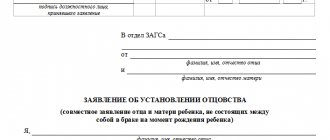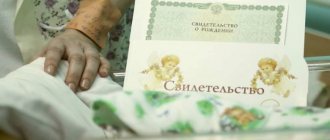Spouses with whom minors live will not be able to obtain a divorce without a trial. We can say that this is considered one of the rights of the child. In the event that the divorce does take place, the child retains the right to live with both his father and mother.
If the parents fail to reach a common agreement, the decision remains with the court, which takes into account the opinion of the child who has reached the age of ten. When he owns donated housing, as well as property transferred by inheritance or shared property, it is not divided during the divorce process.
During the period the parents live together, property is shared and even transactions may be concluded on behalf of the minor, but in the event of a divorce, the division of this property is impossible.
Children's rights are protected by the Housing Code. If a child has a share in a privatized apartment, then the right to own the share remains with him or her if the parents divorce.
Do children from a first marriage have the right to inheritance?
The situation when a family union ends in divorce occurs quite often. After the official termination of the marriage, parents continue to be bound by certain obligations if they have children together.
In such a situation, after the death of one of the parents who left the family, the question arises as to whether the child from his first marriage has the right to inheritance? The law states that you can receive an inheritance by will and by law.
According to the will, the inheritance passes to those persons who were indicated in it by the testator. Otherwise, the inheritance procedure takes place according to the law. What does this mean?
This means that the inherited property will be received equally by the heirs. To make it clearer, if there are 2 heirs, then each will receive 1/2 of the share.
It does not matter into which marriage the children were born, according to the law, in the order of priority for receiving an inheritance, they are the first.
The presence of a will and its impact on the order of inheritance by children
The procedure for accepting an inheritance by children is greatly simplified by the will of the parents. If everything is left to the children from the second marriage, the children from the first will not be able to claim anything. And vice versa. True, according to the law, it is possible to challenge a will, but the court initiates such a procedure only if there are the most serious grounds . For example, if there is evidence that at the time of drawing up/signing the will, the testator was incapacitated and did not realize his own actions.
If at such a court hearing the testator's will is declared invalid, all heirs will be called upon to inherit according to the law, in the established order and priority.
If there is a will
A child born in a first marriage can claim an inheritance and is considered a first-degree heir. It is possible that a parent makes a will without including children from his first marriage.
Inheritance in such a case will occur by will. The Civil Code of the Russian Federation states in Article 1119 that the testator has the right to deprive one or more heirs of property by will.
However, there is one important point that is provided for by law. If a child from a previous marriage is a minor or disabled, he can receive the due share regardless of who should inherit the property under the will.
Article 1149 of the Civil Code of the Russian Federation states that the size of such a share is equal to half the share that the minor would have received if a will had not been drawn up.
For example, according to the will, the testator’s apartment is inherited by the spouse and child, but a minor or disabled child was not included in the will. By law, he could claim a 1/3 share of half the apartment. According to Article 1149, he inherits half of 1/3, that is, 1/6 of the share.
A child can challenge a written will according to the following points:
- the will was drawn up incorrectly;
- the testator wrote a will after he was declared incompetent;
- the testator could not control his actions when writing;
- the parent was influenced, misled or threatened with violence;
- in case of a sham transaction.
If there are violations of at least one of the points, it is quite easy to invalidate the written will; this is done in court. Under new circumstances, the process of obtaining valuables will occur according to the law.
To obtain a positive result in recognizing the invalidity of the will, the heir must apply to the court with an application. However, this is done only after the opening of the inheritance.
Persons who were on the list of the will reserve the right of inheritance, but according to the law.
Property subject to inheritance
Since our article deals with the inheritance of property by children born in the first marriage, a logical question arises: what property can be included in the inheritance?
After all, if the testator has registered a new marriage, then everything that was purchased in the subsequent marriage is joint and belongs to the spouses under the right of joint ownership. And it doesn’t matter with what funds it was purchased and who is the title owner. One half of the property belongs to the spouse, the other half to the wife.
If one of the representatives of a married couple dies, the estate will include half of the joint property, as well as property that is the personal property of the deceased (inherited, gifted).
Thus, not everything that was purchased by a parent in subsequent marriages can be claimed by a child born in the first marriage.
Unworthy heirs
Legally, the separation of children is not provided for by law. This means that there is no difference from which marriage they were born.
Children from different marriages have the right to equally claim the property remaining after the death of their parents if the deceased testator is indicated as the father or mother on the birth certificate.
However, there are cases when, according to the law, the heir is recognized as unworthy to receive property. In the current circumstances, they have nothing to do with the inheritance procedure.
A child can be recognized as an unworthy heir in several cases:
- an attempt to assassinate the testator or other heirs;
- a deliberate attempt to hide other heirs;
- an attempt to increase one’s share of the inheritance by illegal means;
- inadequate care of a parent, if the court has assigned such a duty.
Persons who are disabled and under the age of majority will also be involved in inheritance.
Dear readers! To solve your problem right now, get a free consultation
— contact the on-duty lawyer in the online chat on the right or call:
+7
— Moscow and region.
+7
— St. Petersburg and region.
8
- Other regions of the Russian Federation
You will not need to waste your time and nerves
- an experienced lawyer will take care of solving all your problems!
Inheritance registration procedure
The procedure for receiving an inheritance is the same for all three options described above:
- contacting a notary office at the place where the procedure was opened (that is, at the place of last residence or registration of the testator);
- collecting the required package of documentation and paying the state fee to obtain the appropriate certificate of inheritance from the notary;
- registration of ownership rights of the received property in the unified Rosreestr.
A child from a first marriage should provide the following documents to the notary's office:
- an application for the issuance of a certificate drawn up in accordance with civil law, without which it is impossible to receive an inheritance;
- applicant's passport;
- evidence of his relationship with the deceased parent (for example, a birth certificate);
- certificate of the date of death of the citizen;
- divorce certificate (if available);
- title papers for the due part of the property (if any);
- a form for payment of a state duty in the amount of 0.3% of the entire value of the share of the inheritance due to the heir, and the amount should not exceed one hundred thousand rubles (according to paragraph 22 of paragraph 1 of part 333.24 of the article of the Tax Code of the Russian Federation).
In the absence of a will, the property is distributed among all successors in equal parts, otherwise the shares of the heirs correspond to the amounts specified in the last will of the deceased citizen.
We recommend reading: how to register a child in an apartment?
Can illegitimate children claim the property of a deceased father?
From the legal side, such a question is not considered correct. In our legislation there is no division between children who were born in the legal marriage of their parents and those who were born in a common-law family.
Children of both categories are equal in their rights in relation to the parent, this also applies to receiving an inheritance. But it’s still worth paying attention to some points.
To be sure that a child whose parents have not formalized the relationship can count on an inheritance, it is necessary to remember on what principle property is inherited. As part of the will, material assets are guaranteed to be transferred to persons from the list of recipients.
The testator decides who will be on this list. It also happens that the biological father does not include children in this list. If the receipt of valuables is considered in the order of legal priority, then a completely different mechanism is provided here.
The first priority includes parents, spouses and children. The regulatory documents say nothing about the category of children who could be limited in receiving an inheritance.
Consequently, illegitimate children can count on receiving the material assets of the deceased father.
The moment of proving the child’s relationship with the deceased father is also important, implying the establishment of paternity.
There will be no problems if the birth certificate contains information about both parents. The difficulty arises when the father does not want to recognize his parental rights. In such circumstances, relationship can be proven through court.
There are cases in judicial practice when recognition of paternity occurs after the death of a parent. When it comes not only to recognition of paternity, but also to obtaining the right to claim an inheritance, you need to file a claim in the interests of a child who was born in a common-law family and is a potential heir.
A genetic examination may also be ordered by the court if it helps to identify circumstances for resolving a civil case.
For examination, fingerprints are taken from the grandmother or grandfather, but other relatives may also be involved . After all the procedures, the court issues a decision recognizing paternity.
Next, the court decision must be presented to the registry office to register the established fact. This will be the basis for an illegitimate child to receive an inheritance.
Who is included in the circle of heirs to the testator's property?
If the testator has not made a will, according to the law, all his children will be able to claim the inheritance. The heirs of the first stage will be:
- full-blooded children from all marriages, regardless of number;
- illegitimate children, if paternity is officially recognized;
- children officially adopted by the testator;
- and even children in respect of whom the testator is officially deprived of parental rights.
There is a rule of inheritance by right of representation. And it has the most direct relation to the children of the testator. For example, a deceased father is legally inherited by his adult son and daughter. But if a son dies before his father, then the children of the deceased son (brother), that is, the grandchildren of the testator, will inherit along with the daughter (sister). And it will make absolutely no difference what kind of marriage both father and son these children come from.
If the father/mother has been deprived of parental rights
When parents lose their rights in relation to their children by a court decision, the rights of the child are not affected. The latter, under such circumstances, inherit values by law and by will. The same will apply to adopted children who, after completing the adoption process, become their own.
A child will not be considered an heir if, after deprivation of the rights of his biological parents, he was adopted by other persons. But there are exceptions here too:
- the son or daughter continues to communicate with the biological parents;
- this fact was considered and established by the court.
Sometimes guardianship authorities enter into an agreement under which minors can live in a foster family. But in this case, neither the guardian nor the guardians have rights and obligations, like children and parents.







